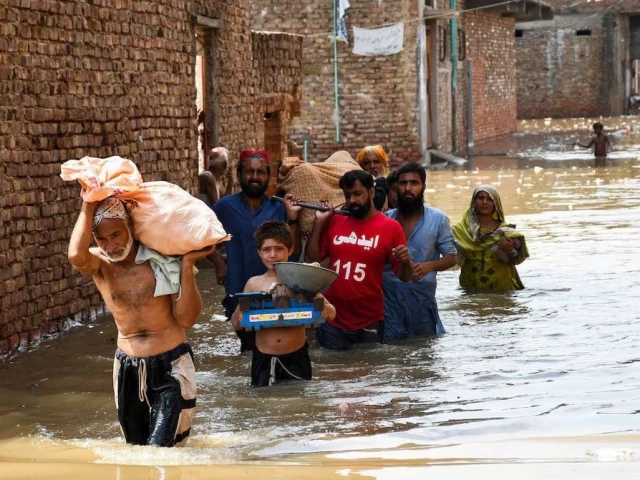The recent sudden floods have killed hundreds and uprooted thousands of lives in northern Pakistan, which is among the 10 most vulnerable countries in the world.
The north of Pakistan is recovering from the devastating sudden floods induced by the climate that killed hundreds earlier this month, destroying houses, infrastructure and livelihoods in many scenes compared to the 2022 deluges catastrophic.
Pakistan is among the 10 countries most vulnerable to the climate in the world, despite contributing less than 1% of world emissions of greenhouse gases. Experts warn that such floods and other calamities are no longer “rare disasters” and are becoming routine clashes in a country poorly prepared to resist them.
The approach, according to these experts, must now be in adaptation, not in emission cuts.
Read more: India alert Pakistan about the next flood threats
“Floods are no longer rare disasters in Pakistan. They are becoming routine clashes that people prepare for each monsoon. Calling them the ‘new normality’ is not an exaggeration,” said the ecologist based in Karachi Rafi-Ul-Haq.
Since mid-August, torrential rains, sudden floods and cloud bubbles have killed more than 460 people throughout the country, even in Kashmir administered by Pakistan and the northern region of Gilgit-Balistan.
The northwest of Khyber Pakhtunkhwa has been the worst blow, where swollen rivers, landslides and collapse houses have buried entire families. Nationally, almost 800 people have died in floods and landslides triggered by rain since the end of June.
Haq said that the intensity of rains and floods is accelerating due to climate change, global warming and merger glaciers. But human actions, unplanned urbanization, deforestation, blocked river routes, lax governance and weak emergency responses, represent up to 60% of destruction.
“Pakistan cannot stop the rain, but can avoid much of the suffering by fixing artificial vulnerabilities,” he said. “Floods will occur, but disasters do not have to do it.”
Ahmed Kamal, an expert in Flood Management based in Islamabad, described the current flood as a “new normality.” The changing monsoon patterns, they said, have intensified the rain and created new hot devastation points.
The Gilgit-Baltistan region, home to the imposing glaciers, has experienced alarming changes. Temperatures have increased constantly, accelerating the melting of the glacier and causing floods of glacial lake bursts. In May, the Chilas district registered an unprecedented 49C (120F).
“We have that our glaciers melt very fast, while winters are being reduced,” Kamal said. “The snowfall was almost 50% below the average last year.”
Also read: More than 406 lost lives in the floods of KP since August 15
He also pointed out the dangers of intensifying the threats of cyclones in Pakistan, saying that the increase in the surface temperatures of the sea in the Arabic sea has changed the activity of the storm to the west, with cyclones increasingly hitting the coast since 2007.
At the same time, the decades of deforestation, promoted by the demand for cultivation and housing lands, have stripped the country of natural flooding shock absorbers. “This has multiplied the frequency and intensity of floods,” Kamal said.
Adaptation, resistance and governance
Experts argue that Pakistan must focus on developing resilience through a mixture of natural and structural solutions.
“Given its economic limits, Pakistan’s priority must be adaptation and resilience instead of emission cuts,” said Haq.
He asked to restore wetlands, mangroves and flood plains to absorb excess water, clear the illegal construction of drainage channels and improve city drainage systems with green infrastructure.
He also emphasized the need for flood -resistant agriculture backed by insurance and social security networks. “The low -cost steps such as drain cleaning prior to the monsoon, early alert systems and community shelters can save lives immediately,” he said, while emphasizing the need to address the planning and corruption of the use of weak land.
Prime Minister Shehbaz Sharif has recognized that the “criminal negligence” of successive governments had allowed the construction of river beds and basins. At a cabinet meeting last week, he promised to clear these invasions.
“Together with this, the largest investments in the management of basins and resistant homes can continue with international climatic finances,” Kamal said.
The expert in Climate Governance Imran Saqib Khalid warned that unless Pakistan takes rapid measures, the future could bring food insecurity, water shortage and mass migration. “Science shows that if we continue in this trajectory, at the end of the century we will arrive near the heating of 2.5 ° C, which will cause ravages,” he said.
Khalid also argued that Islamabad must unite forces with other low -emission nations to demand more fair global action and finance.
Kamal concluded in an optimistic note, saying: “The challenge is huge, but the window of opportunity is still there. With scientifically intelligent adaptation strategies, at least we could mitigate much of the devastation.”




